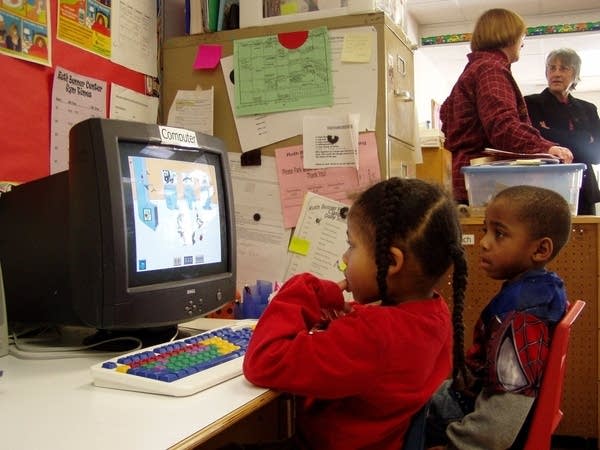Is early childhood education still a top priority at the Capitol?

In the first week of the legislative session, Assistant Senate Majority Leader Tarryl Clark, DFL-St. Cloud, introduced Senate File 3, a bill that would provide state subsidies for parents to pay for preschool programs. Clark has been a strong supporter of early childhood education, and her bill's price tag wasn't cheap -- $200 million a year. But when Senate DFLers released their education spending package last week, it contained just $2 million for the so-called parent allowances. Early childhood advocates were outraged.
"If that's all they're going to do, that is woefully inadequate," said Todd Otis, president of Ready4K.
Ready4K is a non-profit focused on school readiness that's running radio ads urging Minnesotans to lobby for more early childhood funding. Otis said he's asked Senators how early childhood funding went from $400 million in Clark's bill to just $11 million, and he hasn't received a satisfactory response.

"The only answer I get is just be patient, this is not the end of the story," Otis said.
Create a More Connected Minnesota
MPR News is your trusted resource for the news you need. With your support, MPR News brings accessible, courageous journalism and authentic conversation to everyone - free of paywalls and barriers. Your gift makes a difference.
The talk among lobbyists and staffers at the Capitol is that early childhood education is part of a deliberate Senate strategy to present a bare-bones budget, and hope the public will demand more spending. And if you listen closely to what Senate DFL leaders are saying, it's clear they would increase early childhood funding if the state raised taxes.
Assistant Majority Leader Clark said while the state's $2 billion projected surplus sounds like a lot of money, half of that money can only be used for one-time expenses, and the other half will be swallowed up by inflation. Clark said she wishes the state could fund preschool subsidies and all-day kindergarten. But without new money, Clark said the state can't afford a big increase in early childhood spending.
"We actually think we need more money. But you need to actually have money to make new investment, do new things, expand what you're doing," Clark said. "We've put together budgets and are in the process of passing budgets that reflect what it really means to not do that."
Clark insists that early childhood education remains a high priority for Senate Democrats. But the Senate spending is less than what either Republican Gov. Tim Pawlenty or House Democrats have proposed. Pawlenty wants the Legislature to approve $29 million for preschool scholarships for families with children at the greatest risk of academic failure. The governor supports a modest increase in early childhood funding, but not a broad new program.

"I'm in favor of some progress on early childhood, but you can't do the big cahuna in this area if you also want to reasonably fund K-12 and higher ed and other important things that we want to do," said Pawlenty.
In the House, an early childhood budget bill would spend an additional $64 million on preschool programs and child care assistance. The bill's sponsor, Rep. Nora Slawik, DFL-Maplewood, said her bill would restore some early childhood funding that was cut during the state's budget crisis in 2003.
"The last four years in the Legislature, all we've done is cut," Slawik said. "We've cut and we've moved the ball backwards, and we've hurt families and we've hurt kids and we've kicked people off the child care system, and we're stopping that."
But Slawik's bill would not eliminate a waiting list for state child care subsidies, which now stands at around 2800 families. Slawik acknowledged her bill doesn't go as far as she'd like.
"It's what we can do with what we have," said Slawik. "And I think every legislator wishes they had a lot more money."
Slawik says it would cost more than $100 million in new money to adequately fund child care and preschool programs. Slawik's caucus has made statewide all-day kindergarten a top priority, so that seems certain to receive funding in the House K-12 bill. Early childhood advocates say they hope the Legislature funds both full-day K and preschool programs. But the two priorities may compete for dollars as the Legislature wrestles with spending decisions.
